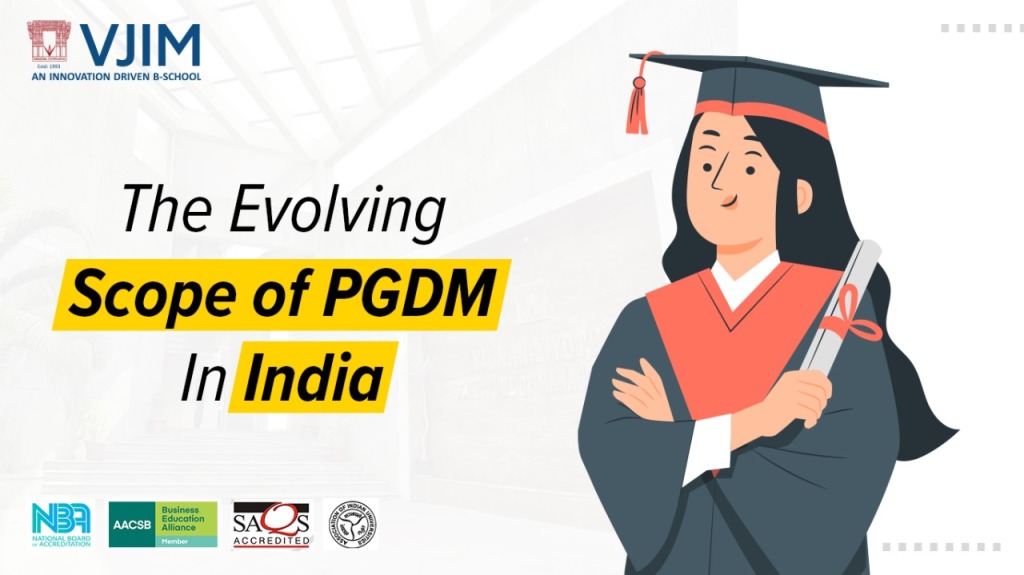
Post Graduate Degree in Management is an interdisciplinary course with various streams. It has an up-to-date syllabus to meet the industry’s broad knowledge spectrum.
PGDM programs are dynamic as the curriculum is often regularly updated to align with industry trends and demands and emphasizes practical learning through case studies, simulations, and projects, providing a hands-on understanding of real-world business scenarios.
PGDM programs are approved by the All India Council for Technical Education (AICTE), ensuring that they meet quality standards. They are also accredited by the NBA, which adds an extra layer of credibility, signifying that the program meets specific quality benchmarks.
In this blog, we share with you the PGDM vs MBA and the Advantages of Choosing a PGDM Program, to help you understand the reason why the value of PGDM In India is high.
PGDM vs MBA
Today, the fields of technology and management are evolving at an unprecedented pace, and to keep up with the latest industry standards and requirements, the syllabus must be continuously upgraded and modified.
The value of PGDM in India stems from its unique blend of theoretical rigour and practical exposure. The PGDM course is always up-to-date with the latest requirements, as it is run by institutes recognized by the All India Council for Technical Education (AICTE). In contrast, the MBA courses are offered by colleges affiliated with the University Grants Commission (UGC).
The syllabus in UGC-affiliated colleges is very rigid, making changes to it difficult. As a result, students often only learn a rudimentary version of the subject, focusing solely on passing exams rather than acquiring practical skills to excel in the industry.
On the other hand, PGDM courses offer a more hands-on approach to learning management skills. As a result, PGDM graduates have the upper hand over MBA graduates in job interviews, owing to their practical skills and theoretical knowledge.
Today’s business landscape is vastly different and complex, with unique challenges organizations face. Therefore, organizations require highly skilled professionals who can navigate the competitive markets effectively. In this context, PGDM students are preferred over MBA students, as the PGDM curriculum is more flexible and better aligned with the dynamic needs of the industry.
Advantages of Choosing a PGDM Program
Industry Interaction and Internships
Many B-Schools have strong connections with industry leaders, facilitating regular interactions, guest lectures, and workshops by industry experts.
Mandatory internships provide students with practical exposure, enabling them to apply theoretical knowledge in real business settings and building a bridge between academia and industry.
Placement Opportunities
PGDM institutes often have dedicated placement cells that work towards securing job opportunities for students.
Strong placement records showcase the employability of PGDM graduates. VJIM has a 92% placement record and has connections to top companies, helping students secure jobs.
Alumni Network
The alumni network is a valuable student resource, offering mentorship, networking opportunities, and insights into various industries.
Soft Skills and Leadership Development
Strong communication skills are essential in negotiating with clients smoothly and effectively. In dynamic corporate environments, teamwork and collaboration qualities are crucial.
VJIM emphasizes personality grooming and exposure along with academic excellence. We are dedicated to self-learning, confidence-boosting activities, and overall personality grooming.
VJIM encourages students to join clubs and committees to gain knowledge, build on their social skills, and be enterprising and innovative in their thought processes. The clubs aim to develop more functional competency by conducting regular exercises like quizzes, newspaper analyses, field trips, seminars, etc.
Curriculum Updates
PGDM, being a professional diploma course, is often updated to include more skill-based knowledge that can be applied to industries in real time, and changes are subject to ongoing industry trends.
Students From Any Stream Can Apply
Graduates from any field can opt to get one step ahead in their careers. A PGDM diploma enhances your chances of gaining a top leadership position in any company. You can choose an industry in which you have prior academic experience and then earn a managerial position in companies working in that industry.
Why Chose VJIM For PGDM
Industry Readiness
The PGDM course that VJIM offers prepares students for entrepreneurship and the corporate world. It is an industry-centric course with equal importance to the practical and theoretical approaches. This approach makes students industry-ready and enhances their chances of finding suitable jobs.
Specialization & Live Projects
The PGDM course offers specialization in Finance, HR, Marketing, Operations, and Business Analytics. The curriculum includes visits to live projects and various industrial sites. At VJIM, the focus is on the practical aspects of these specializations, which gives students an edge in the job market.
Confidence Booster
VJIM offers several activities to improve students’ competency and confidence. The exposure and hands-on knowledge gained through seminars, guest lectures, international conferences, industrial visits, corporate internship programs, corporate mentoring, self-learning, confidence-boosting activities, and overall personality grooming help students confidently perform their tasks.
Team Players
Being a team player is crucial in business and the corporate world. At VJIM, clubs and committees are part of the PGDM course. They encourage students to be efficient team players and develop their social, enterprising, and innovative skills.
External events like the feast Chrysalis and the T10 cricket tournament hosted in collaboration with The Hindu Future India Club (FIC) are part of VJIM. Such events encourage students to participate and work as team players.
Profitable Teachings:
The PGDM course at VJIM teaches students how to market their products and services in competitive environments. It focuses on cost-effective production ability, which helps students sustain a competitive environment.
Sharpening Multiple Skill Set
The PGDM course at VJIM hones students regarding interpersonal behavior, sustaining competition, critical thinking, and decision-making. Most of these throughout the course are based on case studies and deal with human dynamics while instilling a multitasking spirit. It teaches various skills and helps students become experts and multifaceted.
Conclusion
The PGDM course is designed to adapt to the industry’s ever-changing needs, providing students with the most relevant and up-to-date management education. It goes beyond imparting technical knowledge and skills by fostering a holistic learning environment that cultivates essential professional skills such as communication, teamwork, problem-solving, and leadership. These skills are invaluable in the corporate world, enabling PGDM graduates to navigate complex business challenges and effectively manage teams.













